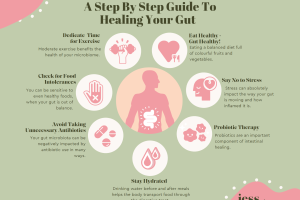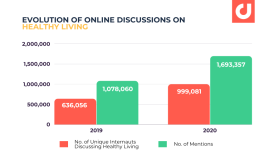Secrets to a Happy Gut: Gut Health and Overall Wellness

Introduction to Gut Health
What is Gut Health?
Gut health refers to the well-being of the entire gastrointestinal tract, which includes the mouth, esophagus, stomach, intestines, and anus. This complex system is responsible for digestion, nutrient absorption, and elimination of waste. The condition of the gut is influenced by what we eat, our lifestyle choices, and even our emotional state. Think of the gut as a bustling city, with trillions of microorganisms from bacteria, viruses, and fungi living harmoniously. These microorganisms play a pivotal role in breaking down food, producing essential nutrients, and supporting our immune system. To simplify, gut health is about ensuring that this vast ecosystem operates smoothly to enhance overall well-being. When balanced, the gut contributes to effective digestion, but when disrupted, it can lead to a range of health issues, including bloating, constipation, or more severe conditions like irritable bowel syndrome (IBS).
- Secrets to a Happy Gut: Gut Health and Overall Wellness
- Introduction to Gut Health
- What is Gut Health?
- Importance of Gut Health
- Understanding the Gut Microbiome
- Role of Gut Microbiome in Overall Wellness
- Factors Affecting Gut Microbiome
- Foods for a Healthy Gut
- Probiotic-Rich Foods
- Prebiotic-Rich Foods
- Lifestyle Choices for Gut Health
- Managing Stress Levels
- Importance of Regular Exercise
- Gut-Brain Connection
- Impact of Gut Health on Mental Health
- Strategies for Improving Gut-Brain Connection
Importance of Gut Health
Understanding the importance of gut health is crucial for maintaining overall wellness. Research has shown that a healthy gut can positively impact not just physical health but emotional and mental health as well. Here are some key reasons why gut health matters:
- Nutrient Absorption: A healthy gut efficiently absorbs vitamins and minerals, ensuring that the body gets the nutrients it needs to function optimally.
- Immune Function: Approximately 70% of the body’s immune system resides in the gut. A balanced gut microbiome helps combat harmful bacteria and pathogens.
- Mental Health: The gut and brain communicate through the gut-brain axis. An imbalance can lead to conditions such as anxiety and depression.
- Inflammation Regulation: A well-functioning gut can help reduce chronic inflammation, a risk factor for numerous diseases.
In essence, nurturing gut health extends beyond digestive comfort; it is foundational for robust immunity, mental clarity, and overall vitality. When people adopt dietary changes or lifestyle modifications that support gut health, they often notice improvements in energy levels, mood, and even skin quality—showing just how interconnected the body truly is.
Understanding the Gut Microbiome
Role of Gut Microbiome in Overall Wellness
The gut microbiome comprises a diverse community of microorganisms that live within our intestines. These tiny companions are not just passengers; they actively participate in our health and wellness. Imagine a bustling marketplace where goods are exchanged—this is similar to how these microorganisms interact and support bodily functions. Some key roles of the gut microbiome include:
- Digestion: Gut bacteria help break down complex carbohydrates and fibers that our bodies cannot digest alone, ensuring that we can extract maximum nutrients from food.
- Vitamin Production: Certain gut bacteria synthesize critical vitamins, such as B vitamins and vitamin K, which play essential roles in metabolism and blood clotting.
- Immune Support: The microbiome educates and modulates our immune responses, helping to fend off infections while simultaneously preventing overreactions that can lead to allergies.
Many people may not realize how interconnected their gut microbiome is to overall wellness. For instance, someone who improves their diet by incorporating more fiber may notice not only better digestion but also enhanced energy levels and mood—an indirect acknowledgment of the microbiome’s influence.
Factors Affecting Gut Microbiome
Several factors can influence the composition and health of the gut microbiome, often in ways we might not expect. Understanding these factors can help individuals make informed decisions to promote a thriving gut environment.
- Diet: A diet rich in fruits, vegetables, whole grains, and fermented foods fosters a diverse microbiome. In contrast, a diet high in sugar and processed foods can lead to dysbiosis—a microbial imbalance.
- Antibiotics: While antibiotics are crucial for battling bacterial infections, they can also indiscriminately disrupt the microbiome, leading to various health issues.
- Stress: Chronic stress can alter gut function and harm the microbiome. Techniques such as mindfulness or yoga can mitigate these effects.
- Sleep: Poor sleep quality has been linked to changes in gut bacteria, which might create a cycle of poor health.
By becoming aware of these factors, individuals can take proactive steps to nurture their gut microbiome, ultimately promoting better health and enhancing quality of life.
Foods for a Healthy Gut
Probiotic-Rich Foods
When it comes to supporting gut health, probiotics are the stars of the show. These live microorganisms are known for their ability to enhance gut flora and improve overall gastrointestinal function. Probiotic-rich foods include fermented products that can introduce beneficial bacteria into your system, promoting a balanced microbiome. Some delicious options to consider:
- Yogurt: Choose plain, unsweetened varieties with live cultures. Yogurt is not only a tasty snack but also offers a good source of calcium.
- Kefir: This tangy, fermented milk drink is packed with probiotics and is often even richer in bacteria than yogurt.
- Sauerkraut: Fermented cabbage that is rich in vitamins and probiotics. It’s a great topping for sandwiches or can be enjoyed on its own.
- Kimchi: A spicy Korean staple made from fermented vegetables, usually napa cabbage and radishes, which provides a delightful kick to meals while being gut-friendly.
- Miso: This fermented soybean paste is commonly used in Japanese cuisine, notably in miso soup.
Including these foods in your diet can lead to improvements in digestion, immune health, and even mood! For example, I started adding a spoonful of kimchi to my salads, and not only did my gut seem happier, but the flavor enhanced my meals tremendously.
Prebiotic-Rich Foods
While probiotics introduce beneficial bacteria, prebiotics serve as food for these microorganisms. Increasing the intake of prebiotic-rich foods can help the good bacteria flourish and create a thriving gut environment. Key prebiotic sources include:
- Garlic: A flavorful addition to many dishes, garlic can enhance gut health while providing antioxidants.
- Onions: Packed with vitamins and minerals, onions also contain its own unique compounds that nourish gut bacteria.
- Bananas: These convenient snacks contain fiber and can help stimulate the growth of beneficial bacteria.
- Asparagus: A nutrient-dense vegetable that not only adds variety to meals but also supports gut health.
- Oats: A hearty breakfast option that is high in fiber, oats are excellent for feeding friendly gut bacteria.
Incorporating both probiotic and prebiotic foods into your daily meals creates a balanced diet that supports optimal gut health. Trying different combinations can lead to new flavors and enhance your culinary experiences. Embracing a variety of these foods keeps the gut happy and helps ensure a smooth digestion, ultimately resulting in better overall health.
Lifestyle Choices for Gut Health
Managing Stress Levels
In our fast-paced world, stress is often unavoidable, but did you know that it can significantly impact gut health? When stress levels soar, the body tends to enter a “fight or flight” mode, which can disrupt digestion and alter gut bacteria. The communication between the brain and gut can become strained, often leading to discomfort, bloating, or even anxiety about eating. Here are some effective strategies for managing stress that can also benefit your gut:
- Mindfulness Meditation: Taking a few minutes each day to practice mindfulness can help calm your mind. Techniques such as deep breathing can lower stress hormones and promote gut health.
- Yoga and Stretching: Engaging in yoga is not only relaxing but can also aid digestion by reducing tension in the body. Consider incorporating a gentle routine into your week.
- Quality Sleep: Prioritize a good night’s sleep as it plays a crucial role in regulating stress. Aim for 7-9 hours, and establish a calming bedtime routine.
- Social Connections: Spending time with loved ones can be a great stress reliever. Whether it’s a coffee date or a chat on the phone, connecting with others lifts your mood and supports your gut.
For instance, when I started practicing daily meditation, I noticed not only a decrease in my stress levels but also a subtle improvement in my digestive comfort. It’s a small yet powerful change!
Importance of Regular Exercise
Exercise is another cornerstone for maintaining a healthy gut. Physical activity doesn’t just keep your heart healthy; it also promotes gut motility and enhances the diversity of gut bacteria, which is vital for a balanced microbiome. Consider these exercise tips:
- Moderate Activities: Aim for at least 150 minutes of moderate-intensity exercise each week. This can include brisk walking, cycling, or swimming.
- Strength Training: Incorporate strength training exercises two days a week to support muscle health and boost metabolism.
- Fun Activities: Choose activities that you enjoy! Dancing, hiking, or joining a recreational sports team can make exercising feel less like a chore.
Research indicates that even short bouts of physical activity can positively influence gut health. Personally, I’ve experienced a huge difference after integrating short, weekly hikes into my routine—what started as a way to get some fresh air transformed into a delightful habit that uplifts my spirit as well as my digestion. Incorporating stress management and regular exercise into one’s lifestyle can profoundly influence gut health. Small, consistent changes in these areas can lead to significant improvement in both physical and mental well-being, ultimately resulting in a happier and healthier gut.
Gut-Brain Connection
Impact of Gut Health on Mental Health
The relationship between gut health and mental health is often described as a fascinating two-way street known as the gut-brain axis. This intricate link means that the state of one’s gut can significantly influence mood, anxiety levels, and even cognitive function. The gut microbiome produces neurotransmitters—like serotonin and dopamine—that directly affect emotions. In fact, it’s estimated that about 90% of the body’s serotonin is produced in the gut. When gut health is compromised, whether through an unhealthy diet, stress, or medications, it can lead to imbalances in these neurotransmitters, resulting in symptoms such as:
- Increased Anxiety: Gut imbalances can trigger the release of stress hormones, leading to heightened feelings of anxiety.
- Depression: Research suggests that individuals with gut dysbiosis may experience higher rates of depression.
- Brain Fog: A troubled gut can contribute to mental fatigue and impaired cognitive function, often referred to as “brain fog.”
I remember when I adopted a fiber-rich diet and monitored my gut health more closely; I was genuinely surprised to find that my mood improved. It was a noteworthy revelation that solidified the connection between what’s inside our bodies and how we feel mentally.
Strategies for Improving Gut-Brain Connection
Given this profound connection, it’s essential to adopt strategies that can enhance both gut health and mental well-being:
- Balanced Diet: Focus on including both probiotics and prebiotics in your meals. These can create a nurturing environment for a healthy microbiome.
- Regular Physical Activity: Exercise not only boosts mood through endorphin release but also positively influences gut microbiota diversity.
- Mindfulness Practices: Incorporate mindfulness meditation and yoga to reduce stress, which can help maintain a balanced gut.
- Adequate Hydration: Drinking enough water is crucial for digestion and nutrient absorption, affecting overall gut health.
- Limit Processed Foods: Try to reduce the intake of sugary snacks and processed foods, which can upset the microbiome balance.
When I started incorporating these strategies into my daily routine, I noticed a significant transformation in my mental clarity and emotional resilience. Taking proactive steps to enhance the gut-brain connection doesn’t just uplift physical health—it can be a game-changer for emotional balance and mental well-being. In conclusion, understanding the gut-brain connection and recognizing its influence offers a powerful opportunity for improving overall health. Small, mindful choices can lead to profound improvements, fostering a healthier gut and a happier mind.





